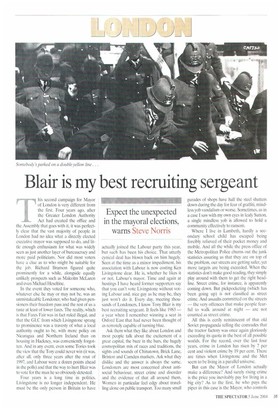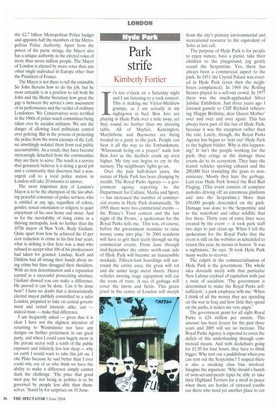Blair is my best recruiting sergeant
Expect the unexpected in the mayoral elections, warns Steve Norris
.1 his second campaign for Mayor ' of London is very different from the first. Four years ago, after the Greater London Authority Act had created the office and the Assembly that goes with it, it was perfectly clear that the vast majority of people in London had no idea what a directly elected executive mayor was supposed to do, and little enough enthusiasm for what was widely seen as just another layer of bureaucracy and more paid politicians. Nor did most voters have a clue as to who might be suitable for the job. Richard Branson figured quite prominently for a while, alongside equally unlikely prospects such as Malcolm McLaren and even Michael Heseltine.
In the event they voted for someone who, whatever else he may or may not be, was an unmistakeable Londoner, who had given pensioners their freedom pass and the rest of us a taste at least of lower fares, The reality, which is that Fares Fair was in fact ruled illegal, and that the GLC from which Livingstone sprang to prominence was a travesty of what a local authority ought to be, with more policy on Nicaragua and Northern Ireland than on housing in Hackney, was conveniently forgotten. And in any event, even some Tories took the view that the Tory could never win (it was, after all, only three years after the rout of 1997, and Labour were a dozen points ahead in the polls) and that the way to hurt Blair was to vote for the man he so obviously detested.
Four years is a long time in politics. Livingstone is no longer independent. He must be the only person in Britain to have actually joined the Labour party this year, but such has been his choice. That utterly cynical deal has blown back on him hugely. Seen at the time as a minor impediment, his association with Labour is now costing Ken Livingstone dear. He is, whether he likes it or not, Labour's mayor. Time and again at hustings I have heard former supporters say that you can't vote Livingstone without voting Labour and, nice guy as he may be, they just won't do it. Every day, meeting thousands of Londoners. I know Tony Blair is my best recruiting sergeant. It feels like 1983 — a year when I remember winning a seat in Oxford East that had never been thought of as remotely capable of turning blue.
Ask them what they like about London and most people talk about the excitement of a great capital, the buzz in the bars, the hugely cosmopolitan mix of races and traditions, the sights and sounds of Chinatown, Brick Lane, Brixton and Camden markets. Ask what they dislike and the answer is always the same. Londoners are most concerned about antisocial behaviour, street crime and disorder and the evidence of that all around them. Women in particular feel edgy about travelling alone on public transport. Too many small parades of shops have half the steel shutters down during the day for fear of graffiti, mindless yob vandalism or worse. Sometimes, as in a case I saw with my own eyes in leafy Sutton, a single mindless yob is allowed to hold a community effectively to ransom.
Where I live in Lambeth, hardly a secondary school child has escaped being forcibly relieved of their pocket money and mobile. And all the while the press office of the Metropolitan Police churns out the junk statistics assuring us that they are on top of the problem, our streets are getting safer, yet more targets are being exceeded. When the statistics don't make good reading, they simply play around with them to get the right headline. Street crime, for instance, is apparently coming down. But pickpocketing (which has been going up) is not classified as street crime. And assaults committed on the streets — the very offences that make people fearful to walk around at night — are not counted as street crime.
All this is eerily reminiscent of that old Soviet propaganda telling the comrades that the tractor factory was once again gloriously exceeding its quota in the best of all possible worlds. For the record, over the last four years, crime in London has risen by 7 per cent and violent crime by 19 per cent. There are times when Livingstone and the Met seem to be living in a parallel universe.
But can the Mayor of London actually make a difference? And surely rising crime is the price you inevitably pay for living in a big city? As to the first, he who pays the piper in this case is the Mayor, who controls the £2.7 billion Metropolitan Police budget and appoints half the members of the Metropolitan Police Authority. Apart from the power of the purse strings, the Mayor also has a unique authority as the elected voice of more than seven million people. The Mayor of London is elected by more votes than any other single individual in Europe other than the President of France.
The Mayor is not there to tell the estimable Sir John Stevens how to do his job, but he most certainly is in a position to tell both Sir John and the Home Secretary how great the gap is between the service's own assessment of its performance and the verdict of ordinary Londoners. We Conservatives were terrified in the 1960s of police watch committees being taken over by socialist militants. We saw the danger of allowing local politicians control over policing. But in the process of protecting the police from the worst excesses of the Left, we unwittingly isolated them from real public accountability. As a result, they have become increasingly detached from the communities they are there to serve. The result is a service that genuinely believes it is doing a good job and a community that discovers that a nonurgent call to a local police station in London will take 20 minutes to answer.
The most important duty of London's Mayor is to be the champion of the law-abiding peaceful consumer of police services, who is entitled at any age, regardless of colour, gender, sexual orientation or religion, to quiet enjoyment of his own home and street. And as for the inevitability of rising crime in a thriving metropolis, look no further than the 107th mayor of New York, Rudy Giuliani. Quite apart from how he achieved the 43 per cent reduction in crime in his first four years, what is striking is that here was a man who refused to accept what 106 of his predecessors had taken for granted. Lindsay, Koch and Dinkins had all wrung their hands about rising crime but then shrugged their shoulders. With an iron determination and a reputation earned as a successful prosecuting attorney, Giuliani showed you can make a difference. He proved it can be done. Can it be done here? I have no doubt that a democratically elected mayor publicly committed to a safer London, prepared to take on central government and vested interests alike, can — indeed must — make that difference.
I am frequently asked — given that it is clear I have not the slightest intention of returning to Westminster nor have any designs on further preferment in our great party, and when I could earn hugely more in the private sector with a tenth of the public exposure and infinitely less lost sleep — why on earth I would want to take this job on. I cite Plato because he said better than I ever could why any of us who think we have the ability to make a difference simply cannot duck the challenge. 'The price that good men pay for not being in politics is to be governed by people less able than themselves.' Stand by for surprises on 10 June.











































































 Previous page
Previous page